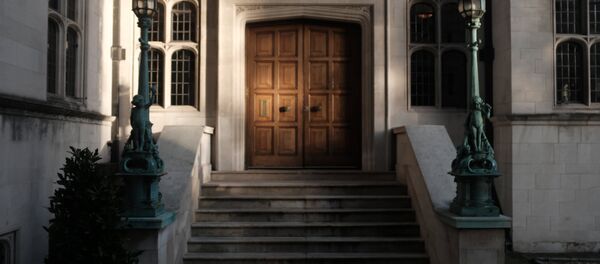Nonetheless, an official army notice published July 2018 notes Gordon MacMillan was appointed “Second Lieutenant (on probation)” in Reserve Group ‘A’ in February 2016 - and somewhat ironically given 77th Brigade’s undercover nature, MacMillan for some time made no secret of his involvement, openly advertising on his LinkedIn that he was “a reserve officer in the British Army serving in 77th Brigade, which specialises in non-lethal engagement”. Since his very public exposure by Middle East Eye, all references to the Brigade have been expunged from his profile – although ‘Royal Military Academy Sandhurst’ is still listed under ‘Education’.
However, MacMillan evidently didn’t get round to conducting a corresponding purge of his Twitter account, for as of 30th September, a number of incriminating tweets remain – and they suggest his relationship with 77th Brigade could date back some time indeed.
Lucky I caught those tweets - @GordonMacmillan
— Kit Klarenberg (@KitKlarenberg) September 30, 2019
deleted the reference to 77th Brigade from his LinkedIn bio already. https://t.co/S2RDGgbyPu pic.twitter.com/IDwu0yUdFI
For instance, in January 2015 he shared a Guardian puff piece promoting the unit’s creation, noting the British army was to create a “Twitter brigade, responsible for ‘non-lethal warfare’” – directly echoing the anodyne description of 77th Brigade’s activities once stated on his own LinkedIn profile.
On March 17th the next year, he posted a Daily Mail article reporting how soldier turned TV explorer (and “heartthrob 10 times tougher than Bear Grylls”) Levison Wood had joined 77th Brigade – which seemingly precipitated a conversation with the unit’s official Twitter account. While the account has since been deleted, MacMillan’s responses imply the exchange was rather jovial – in one tweet he suggests “it can be done just about crafting message”, in another he notes “it's hard to get it all into 140 characters!”.
— Kit Klarenberg (@KitKlarenberg) September 30, 2019
Quite what ‘it’ was isn’t clear in either case, but whatever the truth of the matter, two months later he posted a link to a “nice film” starring none other than Levison Wood, discussing how “[the] spirit of the Chindits is being revivied [sic] for the infomation age” in the form of 77th Brigade – the accompanying clip has sadly since been removed from the web.
To say the least, it’s curious and suspect in the absolute extreme that a senior Twitter apparatchik so openly and positively promoted the activities of a British army military intelligence operation specifically seeking to weaponise the very platform he works for - although it’s somehow even more curious and suspect the senior Twitter apparatchik in question also donates his spare time to that very same military intelligence operation.
Wilderness of Mirrors
The official British army website listing for 77th Brigade offers little illumination on the unit’s raison d’etre or modus operandi, merely describing its aim as “[challenging] the difficulties of modern warfare using non-lethal engagement and legitimate non-military levers as a means to adapt behaviours of the opposing forces and adversaries”. An accompanying ‘What We Do’ section states the endeavor engages in “audience, actor and adversary analysis”, “information activity and outreach”, “counter-adversarial information activity”, “collecting” and “disseminating” media, and monitoring and evaluating “the information environment”.
The unit's name invokes Major-General Orde Wingate's Indian 77th Infantry Brigade long-range penetration unit which fought behind enemy lines in the Asia-Pacific theatre of World War Two. The unit is also split into six separate 'columns', the fifth being its media operations unit — potentially a reference to the phrase 'fifth column' coined by Emilio Mola, a nationalist general during the Spanish Civil War.
In 1936, he told a journalist four columns of nationalist troops would attack Madrid from the outside, while a "quinta columna" of covert supporters inside the city would undermine the Republican government internally. Ever since, it’s become parlance for a covert faction of subversive individuals who aim to undermine a group from within – whether an intentional allusion or not, the designation’s a fitting one given the unit creates fake profiles to influence and subvert online discussions both at home and abroad.
— Frank Butcher (@IAmFrankButcher) September 30, 2019
Much more candid insight was offered by General Nick Carter, Chief of UK Defence Staff, in a February 2018 speech to the Royal United Services Institute. Referring to 77th Brigade as an “information warfare” initiative affording the military “the capability to compete in the war of narratives at the tactical level”, he quoted a passage from David Patrikarakos’s book ‘War in 140 Characters’, about the ongoing conflict in Ukraine.
“I was caught up in two wars: one fought on the ground with tanks and artillery, and an information war fought largely, though not exclusively, through social media. And counter intuitively, it mattered more who won the war of words and narratives than who had the most potent weaponry,” Patrikarakos wrote.
“He also observed that, ‘social media is throwing up digital supermen: hyper-connected and hyper-empowered online individuals’. I’d like a few of those in 77th Brigade please,” Carter said.
Despite his entreaty for more cyberwarriors – a surely pressing and urgent need given the unit has consistently fallen short of recruitment targets since its creation – the General went on to say he was “very impressed” with the “remarkable talent” 77th Brigade had attracted to its ranks, particularly in the diverse fields of “social media, production design, and indeed Arabic poetry”.
“Those sorts of skills we can’t afford to retain in the regular component but they are the means of us delivering capability in a much more imaginative way than we might have been able to do in the past. We now have over 30,000 on the books in terms of the reserve and they are available to deploy with the regular component, if they’ve got the time and if their employers can release them, whenever they want to,” he concluded.
It’s uncertain whether MacMillan was one of the “remarkable talents” Carter mentioned - although his status as a Group ‘A’ reservist means he can be “called out” into permanent service. Considered in tandem with the General’s reference to reservists being deployed along with regular soldiers “if they’ve got time and if their employers can release them”, this raises the obvious question of whether MacMillan has ever taken a ‘sabbatical’ from his duties at Twitter in order to assist 77th Brigade full-time, with the social network’s knowledge and consent.
If so, this would mean Twitter has willingly offered up an upper-echelon employee – and by association their intimate insider knowledge of the platform – to a British army operation that seeks to exploit and undermine the social network for its own ends. To call such a subterfuge a supremely sinister conflict of interest barely covers it – although the prospect of MacMillan conducting ‘information warfare’ operations for 77th Brigade concurrent with his work for Twitter is even more troubling.
Answers Unforthcoming
There’s no suggestion Twitter and 77th Brigade have any kind of direct or indirect relationship, save for MacMillan’s dual-role at both organisations. Still, while professing in an official statement issued to Middle East Eye to “actively encourage employees to pursue external interests” while remaining “open, neutral and rigorously independent”, his work for 77th Brigade seems a strange thing for his superiors to permit, whatever form it takes.
After all, the social network has made much in recent months of its commitment to ridding itself of networks of “coordinated accounts” engaged in state-backed “information operations” and “platform manipulation”, and publishing accompanying datasets on the accounts involved. On 20th September for instance, it issued a statement outlining how hundreds of accounts based in China, Ecuador, Egypt, Hong Kong, Saudi Arabia, Spain, and the United Arab Emirates it determined had attempted to “sow discord” and amplify government messages had been permanently banned.
It was the fifth mass-defenstration of state-backed accounts conducted by Twitter since October 2018 – although notably, not once have the users in question been based in the US or UK, despite both countries very clearly and openly maintaining dedicated ‘sockpuppet’ networks to spread propaganda and disrupt discussion on social media, with Operation Earnest Voice and 77th Brigade being particularly blatant examples.
— Kit Klarenberg (@KitKlarenberg) September 30, 2019
In this context, other elements of MacMillan’s social media activity gain a distinctly suspicious character. For instance, on LinkedIn he follows a number of pages connected to the UK Labour party – but on Twitter, his assorted postings about the party, and in particular its leader Jeremy Corbyn, are unrelentingly negative.
— Kit Klarenberg (@KitKlarenberg) September 30, 2019
This seeming disconnect is particularly dubious given the 77th Brigade was created by the Institute for Statecraft, the controversial state-funded parent 'charity' of the Integrity Initiative, a UK government military intelligence operation which has sought to smear and undermine Corbyn and his supporters on and offline.
"We have supported the creation of special Army reserve units (e.g. 77th Brigade and SGMI — Specialist Group Military Intelligence) with which we now have a close, informal relationship. These bring in as reservists…individuals who are very senior civilian experts in some relevant area, such as Hedge Fund managers, senior bankers, Heads of PA companies…People whom the Army could never afford to hire, but who donate their time and expertise as patriots," Dan Lafayeedney, former SAS operative and Institute co-founder, noted in one of his organisation’s internal files.
Institute staffer Simon Bracey-Lane, who prior to joining the organisation served as a regional organiser for Bernie Sanders’ 2016 Presidential campaign and presented himself to US media as a “recent university graduate" inspired to join Labour in September 2015 after Corbyn was elected leader, is likewise a LinkedIn ‘fan’ of Labour party.
In any event, under the auspices of this “close, informal relationship”, in October 2018 the Institute submitted a joint application with notorious US PR firm Edelman to the Foreign & Commonwealth Office, proposing to manage a three-year programme “[assisting] the building of good governance in the Western Balkan states, countering corruption and enhancing their resilience to corruption” in order to “enhance their overall progress toward EU and, where relevant, NATO membership”.
The bid forecast a sizeable team for the project, drawn from both organisations – among the nominees within Edelman’s ranks were Simon Patterson, a former Intelligence Corps Officer and serving 77th Brigade reservist, said to be “specialised in developing integrated communications and influence campaigns”, and Alastair Aitken, former 77th Brigade Commander and Senior Fellow of the Institute of Statecraft, who retired unexpectedly from the unit in October 2017.
There’s more than a slight whiff of corruption emanating from the proposal – after all, the extensive, long-running ties between the individuals and organisations named in the application and the British state would surely grant a foot in the door and then some with the very Whitehall department to which the pitch was directed. Moreover though, that current and former 77th Brigade luminaries are operating at the highest levels of the public relations industry is both disquieting and unsurprising given the unit seeks to enlist media practitioners of every sort – including journalists, admen and women and communications professionals – to its ranks. Aitken’s senior position in the firm would potentially afford 77th Brigade significant opportunities for surreptitious recruitment in many fields relevant to the unit's activities.
Whether it has or not can only be a matter of speculation – although what’s clear is the vital dividing lines between military and civilian life have been critically compromised in far too many areas, corrupting both codified and unspoken democratic separations of power. Moreover, it’s evident the Institute for Statecraft has played a pivotal yet clandestine role in this hazardous erosion – and Gordon MacMillan is just one example of the toxic phenomenon.
It’s anyone’s guess how many other senior figures in the world’s biggest media organisations have been attracted to the ranks of 77th Brigade and/or other similar information warfare initiatives the public has no idea about, although I’m currently engaged in an intensive probe of the question, and will share whatever I can unearth as and when possible.




